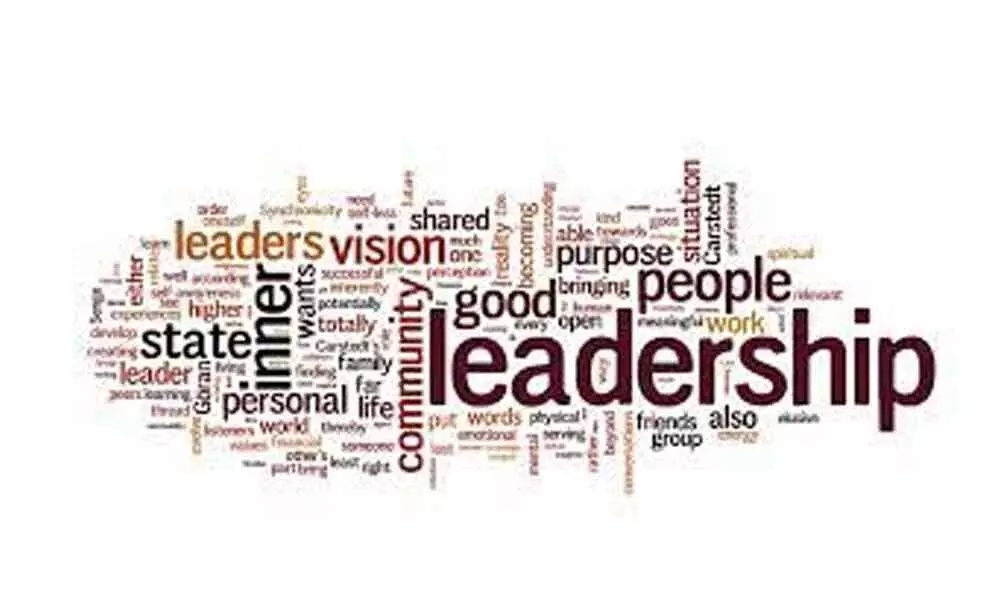Live
- Public Participation Key to Strengthening Democracy-Annamalai
- MLA Anirudh Reddy gets threat letter from Maoist
- "Awareness Program on Road Safety for Auto Drivers Held in Aija Town".
- MLA Bandla Krishna Mohan Reddy Inaugurates NPL Season-4 Cricket Tournament in Netivanipalli
- Rangoli Competitions Showcase Tradition and Creativity in Gadwal.
- "Vadde Obanna: A Revolutionary Hero’s Legacy Celebrated on His 218th Birth Anniversary".
- District Administration Accelerates Implementation of Welfare Schemes.
- Illegal Transportation of Gravel and Soil in Sankalmaddi Village Raises Concerns
- Weavers Celebrate Telangana CM Revanth Reddy’s Welfare Initiatives with Milk Ablution in Aiza.
- MLA Couple Attends Oath-Taking Ceremony of New Governing Body at Shri Shri Jamulamma Parashurama temple in Jammi chedu.
Just In
The role of student leadership programmes in business schools


The world today is witnessing rapid transformations due to technological advancements, climate crisis, geopolitical shifts and changing consumer expectations.
The world today is witnessing rapid transformations due to technological advancements, climate crisis, geopolitical shifts and changing consumer expectations. The CEOs of tomorrow will have to be resilient and possess a strong growth mindset to successfully navigate the unpredictable business landscape. Progressive B-schools with robust student leadership programs can help to shape these leaders of the future.
A good student leadership programme should be aimed at developing skills for a purpose-driven growth. The World Economic Forum’s Education 4.0 framework underscores Global Citizenship Skills, Technology Skills, Innovation and Creativity, and Interpersonal Skills as the topmost competencies for students to thrive in an unpredictable world. The student leadership programs must be directed towards creating leaders who can think critically, solve complex problems, empathize, motivate teams and have a vision that puts profits on par with people and planet.
Some of the focus areas of these Student Leadership Programs should be:
• Industry-Ready Skills
The industry is in a state of perpetual transformation. Artificial Intelligence and automation are disrupting businesses by replacing low-skill jobs but also enhancing efficiency and productivity for those who harness technology’s potential. The CEOs therefore have to be up to speed with tech advances. Equally, they should master financial planning, analysis and decision-making to drive company growth and stability. A CEO should inspire a positive organizational culture by fostering trust and confidence among employees, investors, consumers and other stakeholders.
• Durable Soft Skills
Besides the technical skills, a good leadership programme must be directed towards creating the durable soft skills which are perennially relevant. Competencies like negotiation skills, effective communication, emotional intelligence, conflict resolution and adaptability help CEOs with building trust, making smart decisions, drive collaborations, address challenges and seize opportunities.
• Immersion and Orientation Programmes
To develop a global perspective and an understanding of the industry dynamics, the leadership program should embed within the learning regimen comprehensive initiatives for international immersion and industry orientation.The scope of global collaborations should be fully leveraged to this end. Moreover, the student leadership program should encompass industry visits by students and mentoring by business leaders for a real world perspective of local and national industries.
Creating i-Lead initiative that is central to the institute’s philosophy and curriculum.
The initiative is intended to create a sense of purpose and understanding that good leaders engage, encourage and motivate.
i-Lead inspires the students to be leaders and it also engages them with inspiring leaders.
It promotes strong values and positive attitudes in every situation. It guides the students to focus on the core values of empathy, energy, flexibility, purpose and action.
Through comprehensive leadership programs, specialized tracks, and global opportunities, B-schools may ensure that students are not only prepared for academic success but are also equipped to lead with confidence, empathy, and integrity in various arenas of life. As leadership challenges continue to evolve, the B-schools have toremain committed to the mission of nurturing capable leaders who are ready to make a positive impact in the world.
(The author is Director General, Jaipuria School of Business, Ghaziabad)

© 2025 Hyderabad Media House Limited/The Hans India. All rights reserved. Powered by hocalwire.com






